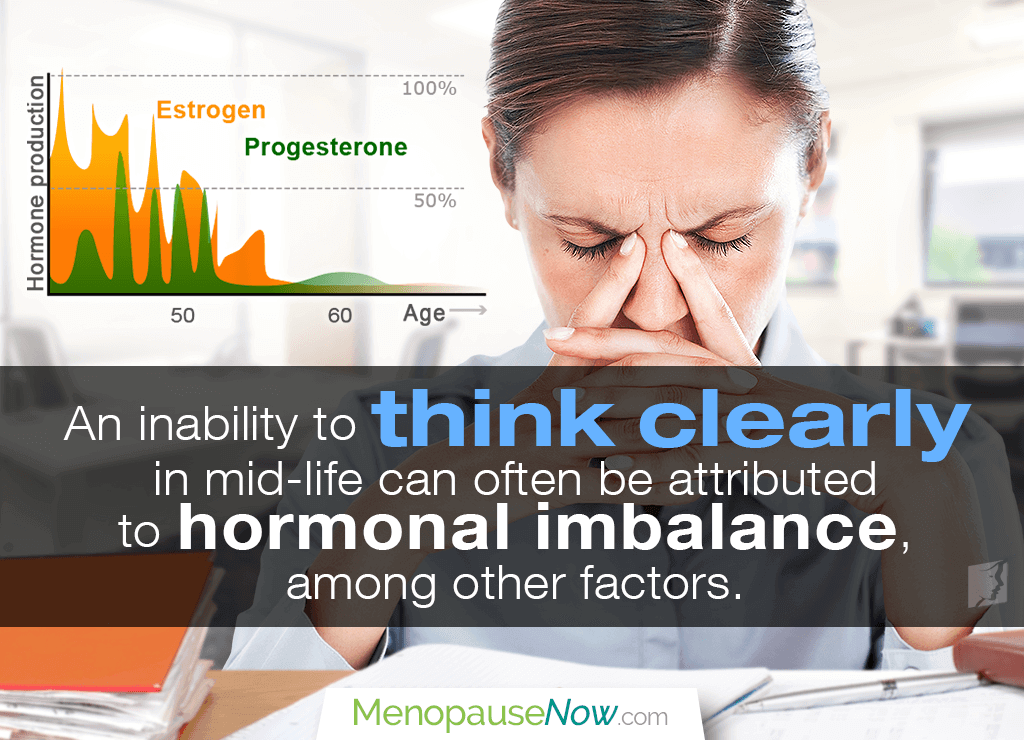When a woman goes from high functioning to having trouble thinking and focusing clearly on a daily basis, she may be wondering what exactly is going on and how she can return to normal. Continue reading to learn all about difficulty thinking during menopause, including why it's occurring and what can be done for optimal cognitive functions from here on.
Why Am I Not Able to Think Clearly?
The most common reason for why middle-aged women have an inability to think clearly is hormonal imbalance.
Throughout women's reproductive lives, the hormones estrogen and progesterone guide the menstrual cycle and encourage the overall well-being of the female body, from the brain to the bones, heart, and more.
As a matter of fact, scientific studies have found that receptors of each hormone have been found on brain areas associated with emotion and cognition.1
Then, during menopause, when drastic hormonal fluctuations ensue due to depletion of a woman's ovarian reserve, physical and psychological health is negatively affected, worsening cognitive abilities and causing women to have trouble thinking and focusing.
These hormonal fluctuations are also the reason behind other menopause symptoms, like hot flashes, night sweats, mood swings, vaginal dryness, irritability, and many more.
What Else Could It Be?
While hormonal imbalance is the most probable cause for inability to think clearly mid-life, menopausal women may also suffer from this symptom due to other causes.
Other factors can include:
- Anxiety
- Depression
- Low vitamin B12 levels
- Hypothyroidism
- Sleep apnea
- Medication side effects
The best way to be sure of the underlying cause is to consult your doctor. Only he or she will be able to properly diagnose you according to symptoms, medical history, and diagnostic test results.
What Can I Do for Help?
Improving concentration can be done in a few simple steps, including by:
- Striving to get better quality or more sleep
- Exercising to boost blood flow to the brain
- Changing to a Mediterranean diet
However, long-term relief will only come once the underlying cause is treated. As aforementioned, in aging women, the root cause is often hormonal imbalance.
To resolve hormonal imbalance, measures can be taken to optimize endocrine system health with treatments for difficulty concentrating, which focus on aforementioned lifestyle changes as well as the use of alternative medicine, which can include phytoestrogenic or hormone-regulating herbal supplements.
Conclusions
Without a doubt, difficulty thinking can be a downer on a woman's lifestyle. However, that does not mean she has to just grin and bear it. By taking the forefront in her mental health and wholeheartedly pursuing options that will help her clear up the brain fog, clear thinking and optimal focus are not far from reach!
Sources
- Harvard Health Publishing. (2016). Is an underlying condition causing your fuzzy thinking? Retrieved December 3, 2019, from https://www.health.harvard.edu/mind-and-mood/is-an-underlying-condition-causing-your-fuzzy-thinking
- The North American Menopause Society. (n.d.). Changes in Hormone Levels. Retrieved December 3, 2019, from https://www.menopause.org/for-women/sexual-health-menopause-online/changes-at-midlife/changes-in-hormone-levels
Footnotes:
- Barth, C. et al. (2015). Sex hormones affect neurotransmitters and shape the adult female brain during hormonal transition periods. Frontiers in Neuroscience, 9, 37. doi: 10.3389/fnins.2015.00037




